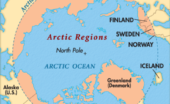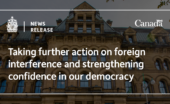Re The UN General Assembly Speaker Schedule is Here! I note that whoever will be speaking for Canada this year…
Wednesday Night #1461
Written by Diana Thebaud Nicholson // March 3, 2010 // Absent Friends, Americas, Antal (Tony) Deutsch, Canada, Economy, Europe & EU, Government & Governance, Herb Bercovitz, John Jonas, Reports, U.S., Wednesday Nights // Comments Off on Wednesday Night #1461
More on Wednesday-Night.com
The evening started on a somber note, as Diana noted with sadness the deaths of Judith Patterson’s husband Jamie Tiller and Julius Grey’s father-in-law, Philippe Casgrain. On behalf of all their Wednesday Night friends, we extend our condolences and deepest sympathies to Judith, Julius and their families.
“A huge gap appeared in the side of the mountain. At last a tiny mouse came forth.”
Aesop: The Mountain in Labour
The Speech from the Throne
Before I heard it, I thought economics was an interesting subject – there’s got to be more to this country than railroads and highways, deficits and taxes
Following a period of presumed parliamentary reflection and as her term of office nears its end, the Governor General presented a lengthy – close to 6,000 words) speech from the throne that gave little inkling of the result of the Conservatives’ navel gazing following the prolonged prorogation of Parliament. But then, as one Wednesday Nighter pointed out – by definition Throne speeches are limited to generalities, good news, etc. The Budget to be delivered tomorrow (March 4) will reveal the details of the Conservatives’ plan and spending estimates amidst concerns regarding transfer payments and stimulation of infrastructure.
Citing President Obama’s recent speech at Georgia Tech, Gerald Ratzer expressed the (forlorn?) hope that Canada would emulate the president’s $6 billion Homestar Energy program.
Greece and the current crisis
To travel in Greece is to visit a totally different world where national pride in independence and difference coexists with a care for humanity and personal and national neighbors. Hundreds of thousands of citizens gather for political meetings vociferously expressing their political views with no police in sight, with neither violence nor crime. This being so, it is understandable that in the present euro crisis, with the government under extreme pressure from the European Union to cut its budget, the noisy demonstrations on the part of the unions reflect more passion and bravado than lack of acceptance of the measures taken by the government. In fact polls indicate that over sixty percent of the population is in favor of these measures and over seventy percent reject the unions’ pressure to refuse them. The demonstrations will continue for a while but there is very little doubt that the measures taken will ultimately be accepted rather than face further instability.
Having underestimated the crisis at the outset, the Greek government has now shown the courage and resolve to deal with it – and fortunately is a left-of-center government, thus immune from serious opposition to its moves. It has made sufficient cuts in the deficit to please both the European Community and the European Central Bank, bankers and bond holders around the world. The public generally understands that today’s problems stem from living beyond the country’s means, and a dysfunctional public service incapable of delivering services. A poll of the ‘700-euro’ generation indicates that this younger generation believes that the reforms that will come out of the crisis are necessary. Effectively, the crisis supplies the catalyst for a major social transformation. Furthermore, the government enjoys the support of the Conservative Party opposition, along with the Communist Party.
The most urgent need is for a loan at reasonable rate of interest, a need that will undoubtedly be met. The bloated civil service (700,000 workers which is twice the number in Canada – and for a country with 1/3 the population) will have to be reduced; pensions and salaries have been frozen, bonuses reduced and sales and sin taxes increased, retirement age increased – all feasible. There is currently no land registry system, hence no property tax, a situation that must and will be changed. As no-one pays income tax and there is no possibility to borrow against real estate, the tax burden has been ‘uploaded’, which implies inability to leverage for improvements to factories, etc., crippling the domestic economy. Barring a recession, however, the cure will be possible, even ultimately beneficial.
Although Greece is currently perceived as the problem threatening the euro and the European Union, unlike other problematic E.U. members including Spain and Austria, the problem in Greece lies mainly in the public sector (the private and cultural sectors being among the least indebted in Europe), hence more easily addressed. In the U.K. and the U.S., private debt is relatively high, threatening the integrity of those countries. Greece (rather than the other PIGS) has been affected at this time because it has the highest debt/GDP ratio and biggest deficit in the Euro Zone including net foreign debt of about 75%. But the Greek crisis has shown not only the weakness in the euro zone, and need for fiscal uniformity, but also the weakness that the entire first world is facing – high debt/entitlement levels. As problems in Greece recede, other dangers will arise. Other countries (Austria, Belgium) have similar problems, high debt loads, immense social entitlements, the huge housing meltdown in Spain – a more serious threat for Spanish banks than any Greek banks have encountered.
The problem with the euro will weigh heavily for some time but the advantages of the union are so much greater than the problems that E.U. members will do whatever is necessary to prevent the union from failing, including institutional reforms. This is what Europe needs, to make further steps towards integration. However, the immediate and medium-term outlook for the euro vis-à-vis the U.S. Dollar, Swiss Franc and Pound sterling is considered bleak by some Wednesday Nighters.
It is conceivable that the European leaders might decide to issue euro bonds, issued by the European Union and a portion of the country bonds would be rolled over into the European Union bonds and then an income tax of 5% would be introduced to cover this cost.This would mirror steps taken in the U.S. and other federations.
Central banks have ceded their power
As long as banks are not lending and people do not want to borrow, the threat of inflation is low. In North America many of the unemployed will never get their old jobs back so we don’t really know the true size of our excess capacity, but it is likely less than unemployment numbers appear to indicate. The exit strategy of the Fed and other central banks from all the excess liquidity becomes key. If they really want to eliminate the deficits and return to more neutral monetary policy, the debt level will increase (cost of servicing debts), which will precipitate a first world debt crisis. Inflation is the only way to avoid this outcome.
One economist suggests that China holds huge cash balances that can be and are being translated into real assets around the world (e.g. Chinese natural resource acquisitions/projects in Africa); and, as prices of assets rise, so do general prices go up. If prices go up, real cash balances will eventually be restored to pre-crisis levels, a very painful process for all those holding cash. Thus, there are many ways that prices in which the economy can adjust itself and the cash issue can be liquidated without central banks making painful announcements. But the prospects are not cheerful.
The market
One – dismal – view of the stock market sees the markets as being ahead of reality and the second half of the year (reality being worse than it is now) as being lower than at present, the current buoyancy of the market as being caused by the availability of funds for investment, partly due to restocking following a positive fourth quarter. If this scenario is accurate, neither stocks nor bonds appear attractive and this maven discourages investment in gold. Commodity prices likely to come under pressure – even soft commodity prices like wheat are also relatively weak , so too for natural gas this summer and oil is over-valued.
M&A activity is still quite strong. Real estate securities are still being issued REITs are somewhat active as are oil and gas, but otherwise the IPO market is very quiet.
U.S. Health care and governance
There have always been lobbyists; that’s why there was a Revolution
Does the First Amendment imply that everyone has a right to pay (lobbyists) whoever you want to have your voice heard?
U.S. Congress, apparently accurately reflecting the view of the American public, continues to be divided on Medicare. Considering the views of the President, the length and intensity of the debate as well as the advancing horizon of November elections, it is anticipated that Congress will ultimately work to achieve a consensus. Neither the cost to the public of any system nor its effectiveness as measured by health statistics appears to be taken into consideration, nor to be a motivating factor. The struggle to achieve this piece of legislation highlights the evolution (or retrogression) of the unique U.S. system of government. One theory suggests that the U.S. completed its “European period” ending with the election of Ronald Reagan and since then has embarked on a new Jacksonianism . It is clear today that there is a huge divide between getting elected and governing. It is incomprehensible to most ‘outsiders’ – the public – why it is so difficult to accomplish anything in a straight forward manner, without all the side deals and entitlements that are run-of-the-mill to Congress. Is the current situation the fault of the system of checks and balances built into the Constitution? It seems to many that the U.S. is in a constant period of election, thus polls exert an extraordinary influence, and that Congress no longer works as effectively as it did some 40-50 years ago. Some of this change may be attributable to the effect of the Vietnam War, changes in how U.S. foreign policy is determined and executed, proliferation of sub-committees, changes in funding rules, the creation of corporate media by the Right – to which the Left has not responded – resulting in more checks and no balances.
Comings and goings:
Holly and John Jonas are off for three months to Aachen, where John is returning as recipient of a Humboldt award, a unique grant from the German government to nourish research and innovation [nothing similar exists in Canada to attract outstanding foreign academics] which John previously won for an entire sabbatical year.
Paul Carvalho is working on a documentary film for Radio Canada [decisions regarding English-language productions are all made in Toronto and this is not a project likely to attract support from there] on the history of Montreal. He is enjoying investigating the incredibly rich photographic archives- incuding those at City Hall – and wondering how he will stitch it all into a 5-hour narrative. Divided into 5 ‘chapters’ – including one on The Main and les autres, focusing on the influence of three major immigrant groups -it is a labor of love, which he will direct, and it represents six years of intensive work and research.
T H E I N V I T A T I O N
The Golden Olympics are now a golden memory and we can again turn our thoughts to such inspiring topics as the return of Parliament after the proroguing – which everyone has now forgotten because of aforementioned Golden Olympics – and Mr. Flaherty’s budget that apparently isn’t going to change much. The Globe & Mail – perhaps too hopefully – does say that the Throne Speech and budget will contain more-than-passing references to innovation, the digital economy, productivity and research – as the saying goes: From their lips to God’s ear. Presumably we will get a foretaste on Wednesday when the Throne Speech is read – and can parse each phrase. We are told it is to be “a mix of bragging about the government’s record steering Canada through the recession and a vision for a future where the Canadian economy is more productive and more reliant on so-called knowledge industries.”
Mr. Harper has, of course, wrapped himself in the success of Canada’s athletes and the VANOC team – not to mention the incredible hospitality and good humour of the local citizens – and has the photo album to remind us all of the key role he played. [If you detect a note of sarcasm, you could be right.] We just wish he had managed to look a bit more engaged when he didn’t realize the TV cameras were on; we will also (almost) refrain from mentioning his sartorial appropriateness.
In any event, the strategy seems to have worked for the party if not his personal popularity [oxymoron?] and the Conservatives are up again in the polls, though still shy of a majority Lest we be suspected of political bias, we add (gloomily) that Mr. Ignatieff continues to lose credibility as the leader of the Natural Governing Party, no matter how hard the loyalists try to repackage him. Ignatieff ends Olympics bringing up the rear
While our news is good as Canada’s economy surges ahead five per cent in fourth quarter, and Rapid global trade recovery continues, there are still plenty of reasons for concern including Greece, Iran, and China – Ed Yardeni lists a few more for your reading pleasure.
And Jeff Rubin weighs in with this cheerful thought: We’re all PIGS now
Wall Street is worrying about financing the PIGS (Portugal, Italy, Greece and Spain), and little wonder. Proposals to halt exploding public sector budget deficits in those countries already have the workers out in the streets in Athens and Madrid. But we needn’t look across the Atlantic to see a debt crisis in the making. The U.S. economy is sporting a record one-and-a-half trillion dollar budget deficit, and even Canada, after running a decade of budget surpluses, is posting its own largest deficit ever.
The Greek debt crisis continues to dominate news and conjecture, with ramifications underlined in the FT piece by Gideon Rachman Greece threatens more than the euro, in which he points out that that if the EU does not move forward politically in response to the Greek crisis, it will move backwards – and the long process of European integration could start to unravel. Meantime, today the euro has fallen to its lowest point against the dollar in 10 months and the FT posts a story: Hedge funds raise bets against euro – Move comes amid growing fears of a regulatory backlash against funds’ trading positions on the specific sovereign debt of Greece and other weak eurozone economies Our favorite economist, Tony Deutsch, has a number of thoughts on this topic, and is worried about Sterling with the comment that For fundamentals like this, regulatory measures are as useful as breaking the mirrors in the house against looking old.
Iran, meantime continues to muzzle any and all opposition; the latest moves include shutting down two opposition papers as the industrial sector suffers from unpaid government debts and a tightening of bank credit. As a result, many factories are operating at a fraction of their capacity. But be of good cheer, the head of the Iranian Air Force has announced that Iran would soon test a new generation, of smart bombs that would be “more precise and enjoy a better destructive capability.”
China’s economy (which the Economic Times claims is weakening slightly) and influence are matters of daily – if not hourly – scrutiny, but we opt this week for an interesting story (written by a former Sauvé Scholar) Thirteen Chinese newspapers have boldly published a joint editorial calling for Chinese to be given freedom of movement across the country.
As though there were not enough to worry about, according to Der Spiegel Online, Germany is worried that the new foreign policy chief, Catherine Ashton, is handing over too many top slots in the European Union’s new diplomatic service to Britons.
The Chilean earthquake provides an interesting contrast with the devastation suffered by Haiti in a quake that was smaller in magnitude, although shallower, and was not followed by a tsunami. We hope that aid can and will be forthcoming in response to President Bachelet’s request for very specific international assistance (field hospitals, temporary bridges, water purification plants, damage assessment experts and rescuers to relieve those already working to find survivors), however, we cannot help but wonder for how long the world will be able to draw on international concern for countries that have suffered from natural disasters. [Nicholas Kristof echoes this sentiment in Does Haiti’s Earthquake Hurt Cambodia? – The silver lining to a tragedy like the Haiti earthquake is that it gets Americans focused on that country’s problems and reaching into their pockets to try to help. We may ignore Haiti’s day-to-day needs, but after the earthquake the outpouring truly was magnificent. There is some risk, though, that that outpouring leads to less money going to the day-to-day needs in other countries.] Aside from the guilt felt by many for the prolonged sorry state of Haiti’s economy and governance, there is an active and vocal Diaspora which has kept up the pressure in countries like Canada and the United States.
Chile, on the other hand, as a relatively prosperous and democratic (save a few awful intervals) country is, as the BBC points out “widely regarded as having the best-run economy in the whole of Latin America”. Tony Deutsch obviously subscribes to this opinion, having sent along How Milton Friedman Saved Chile
Chile’s stringent, well-enforced building codes saved most modern buildings and countless lives. Still, extensive use of adobe in older structures meant that many of those buildings fell in the hardest-hit regions of the country. There was widespread destruction of older buildings-together with damage to bridges and roads, and coastal flooding caused by the tsunami (WSJ). It seems the country was well prepared for the quake, but suffered from the tsunami that followed and for which there was no warning.
Chile’s earthquake also prompted Christopher Hitchens to write a thought-provoking piece Long live democratic seismology that ponders the ‘hideous’ implications of an earthquake in Iran, pointing out that “the effects of upheavals of the Earth can now be quite expertly studied, and even predicted, along a series of intersecting graphs that measure them against demography, income level, and – this is a prediction on my part – the vitality of democratic institutions.”
Finally, as we all know, Wednesday Night has vast tentacles. Thus no-one should be surprised that a sometime Wednesday Nighter was in Valparaiso. A message says that despite the intensity of the quake – about a 7 – in a city of some 500,000, there were only a few walls and building facades that collapsed; 4 people died; there were no disruptions to services other than lack of power; and most of life continued pretty normally. Viva Chile!
For those who are not following the trial of Radovan Karadzic, it may have gone unnoticed that he claims Bosnian Muslims ‘killed own people’ in Sarajevo and dismissed the Srebrenica, massacre as another “myth” designed to engender sympathy for Bosnian Muslims. Cleverly, he seems to be building a defense by claiming that none of the events in which he is implicated ever happened.
Back to Canada – the Rights & Democracy story will NOT go away. Not only has the new president’s appointment attracted much unwelcome and unwelcoming attention, but today Embattled group Rights and Democracy fires three senior managers. Julius Grey, who represents the three, said they were fired for alleged insubordination. We wonder if R&D is really ready for Julius?
Something you may have missed from a previous Invitation is Will buying food locally save the planet? from former Wednesday Nighters Pierre Desrochers & Hiroko Shimizu (now in Toronto but still writing for Michel Kelly-Gagnon and MEI). More recently, Michel has co-authored a piece on Quebec pensions Are public sector pension plans too generous? – we doubt there will be much debate on that.
Rapid global trade recovery continues
Economists have been puzzling over why the fall in international commerce was so rapid. Between October 2008 and January 2009, global goods trade fell by about 20 per cent, a faster decline relative to economic growth than during the Great Depression.
Some analysts initially wondered whether the fall could be blamed on supply-side factors such as a shortage of trade credit – the transactions that finance cross-border business – or a rise in protectionism. But economists are beginning to think that the fall was caused by a simple decline in demand, amplified by the synchronised nature of the downturn and global supply chains transmitting the weakness rapidly.



